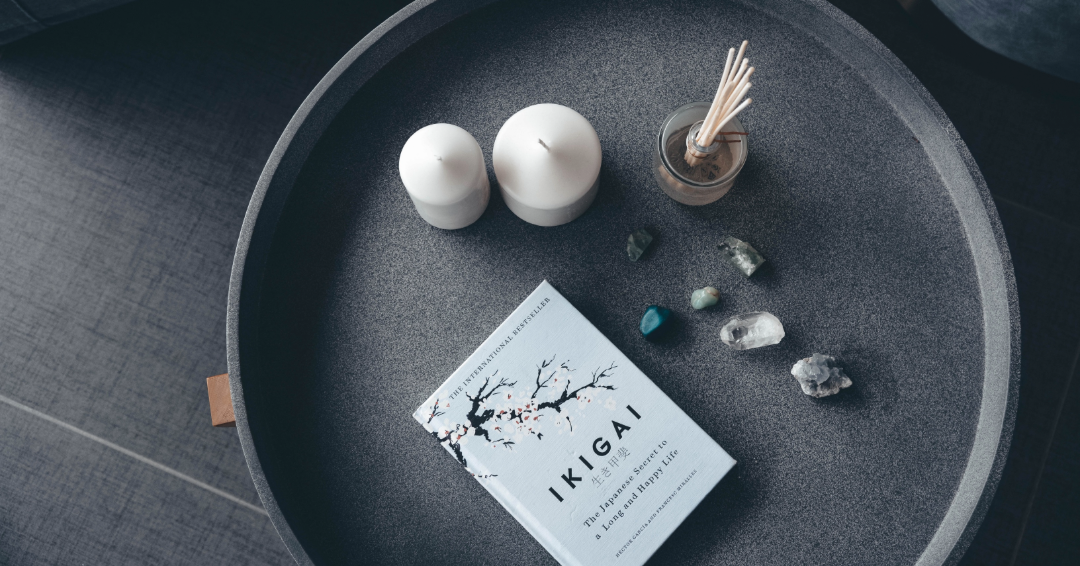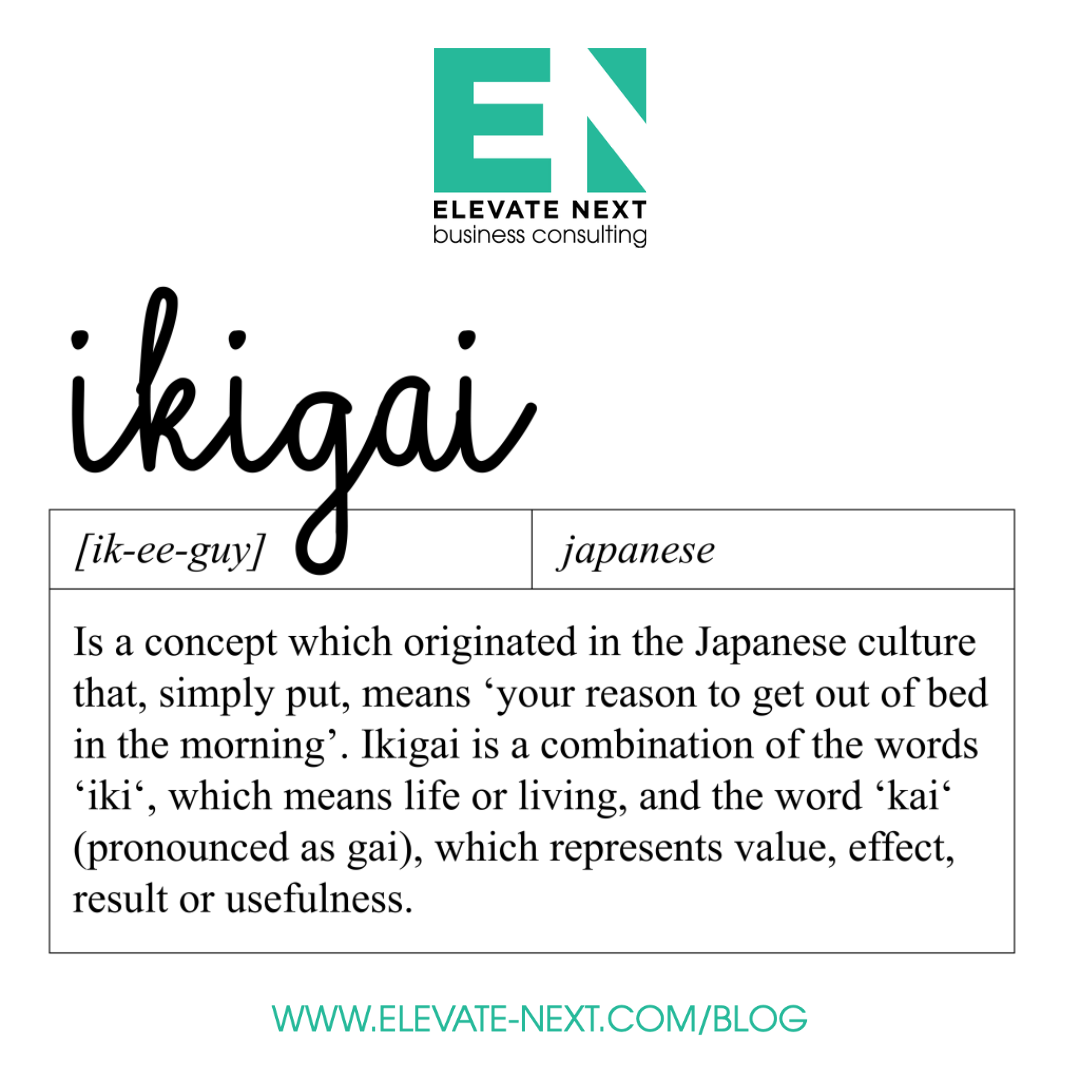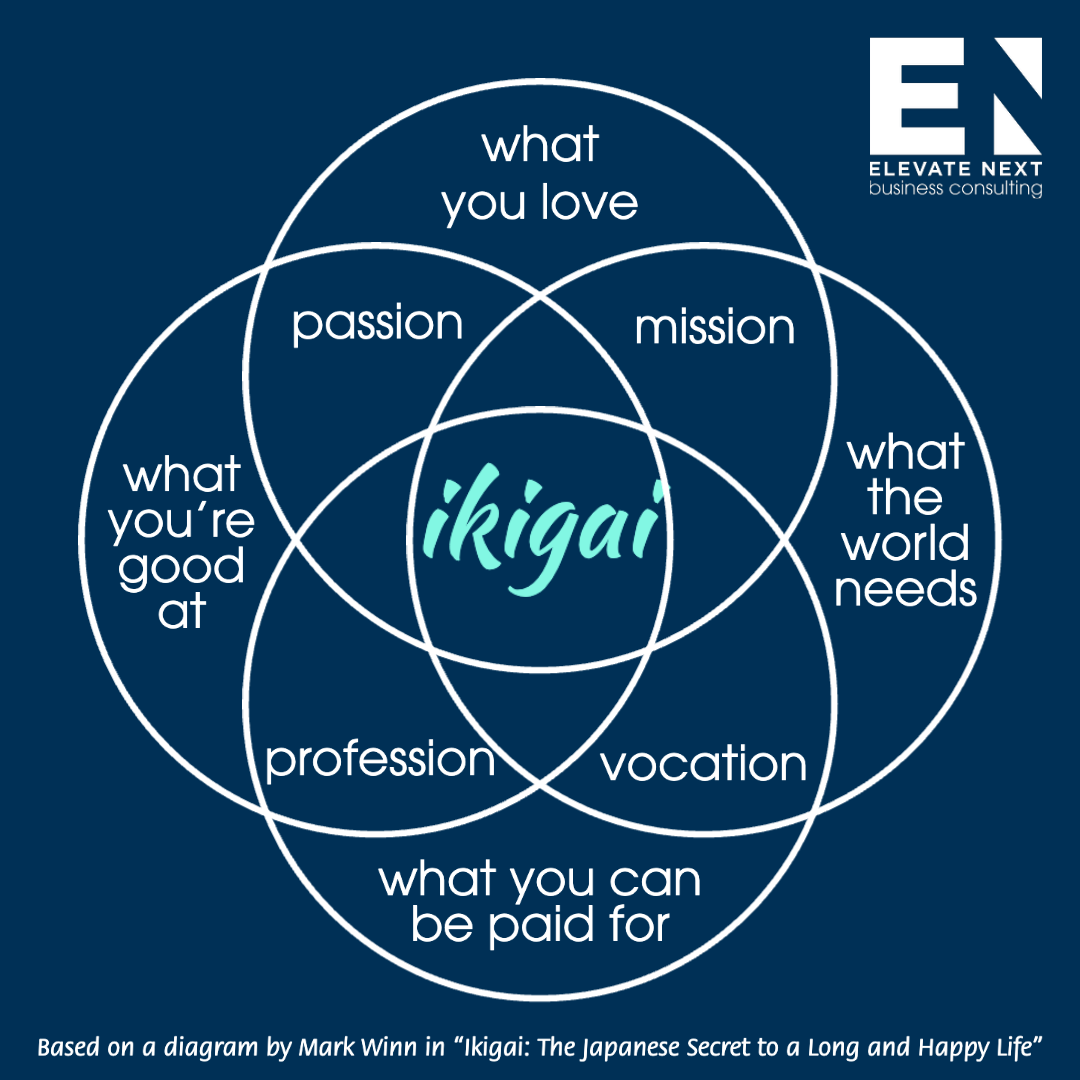Find Your Ikigai
"Ikigai: The Japanese Secret to a Long and Happy Life" by Héctor García and Francesc Miralles | Photo credit: Unsplash
I found the international bestseller, Ikigai: The Japanese Secret to a Long and Happy Life written by Héctor García and Francesc Miralles, full of practical recommendations for finding meaning in a long, well-lived life. I felt compelled to share a few of their recommended practices for finding purpose in life. These simple practices can be implemented by anyone at any point in their career and beyond.
What is Ikigai?
Ikigai is the Japanese word that means your purpose for living - or the reason to get up in the morning. In Spanish, it is your plan de vida and in French, your raison d’être. According to the Japanese, everyone has an ikigai - you just need to be patient enough to find it.
Stay active - and don’t retire.
García and Miralles recommend continuous low-intensity, gentle movements (like walking, gardening or yoga) over your lifetime, rather than high-intensity workouts. Although they say don’t retire, as that will shorten your lifespan, they don’t necessarily mean from your job. Rather, you shouldn’t retire from pursuing and practicing your ikigai, which “brings satisfaction, happiness, and meaning to our lives.”
Only eat what think you need and consume a balanced diet.
According to the authors, a common saying in Japan is “Hara hachi bu,'“ which means something along the lines of “‘Fill your belly to 80%.’ Ancient wisdom advises against eating until we are full.” Although there is no way to objectively know when your stomach reaches 80% capacity, the idea is to stop eating before you’ve reached the infamous, seemingly American, state of “food coma.”
In scientific terms, over-eating wears down our bodies with “long digestive processes that accelerate cellular oxidation.” Eating fewer processed foods and incorporating certain food types, such as fruit and vegetables, into your diet also helps reduce the rate of cellular breakdown (otherwise known as aging) in your body.
Find community (moai).
A moai is “an informal group of people with common interests who look out for one another." Developing your moai, which the authors also describe as a “close-knit group of friends,” can increase your sense of security - sometimes even financial security in the case of communities in Okinawa - with feelings of belonging and support from a group. Developing a strong sense of community is also key to managing a work-life balance.
Maggie Wooll of BetterUp agrees with García and Miralles. Involvement in a community can reduce stress and “increase feelings of solidarity and fulfillment, which can be important both personally and professionally. And a strong sense of purpose can even help you live longer.” Tracy Bower, a contributor at Forbes, also writes that “our health and happiness are inextricably linked with our connections… Communities take care of their members and vice versa—because they are invested in the collective success of the group.”
Practice mindfulness and go with the flow.
Finding flow means that you are focused on a single concrete task in the present. There is no past or future and there are no distractions diverting your attention from your current activity. García and Miralles define flow, or a state of mindfulness, as occurring when “you are completely immersed in the experience, not thinking or distracted by anything else.”
“When we practice mindfulness,” writes the Greater Good Magazine, “our thoughts tune into what we’re sensing in the present moment rather than rehashing the past or imagining the future.”
Ask yourself: What were you doing during the moments that absorbed your complete attention and you were the happiest? Were you pursuing your passion?
Embrace change and become antifragile.
Becoming resilient - and even antifragile - will help you overcome obstacles and result in personal growth. Diane Cotu, in How Resilience Works, writes, “Resilient people possess three characteristics — a staunch acceptance of reality; a deep belief, often buttressed by strongly held values, that life is meaningful; and an uncanny ability to improvise.”
Authors, García and Miralles, quote Nassim Nicholas Taleb’s Antifragile: Things That Gain From Disorder, which explains the difference between resilience and antifragility: “The resilient resists shocks and stays the same; the antifragile gets better.”
The authors also remind us to continuously “expose yourself to change, even if stepping outside your comfort zone means feeling a bit of anxiety.” As the owner of Driftwood Adventure Treks, Briana Gallo, always reminds me, “Change is good.” The slogan for her company is “Courage is the power to let go of the familiar,” which is encouragement to challenge yourself (within reason) in order to achieve personal growth.
A little bit of temporary anxiety caused by change is OK; but, be sure to practice mindfulness to avoid a long-term state of constant stress. Stress is not only detrimental to your health, but it will also block you from discovering and pursuing your ikigai. Embracing change with a positive attitude and a little humor go a long way.
Finding What You Love
Ikigai: The Japanese Secret to a Long and Happy Life is a well-written, easy-to-read guide, which I recommend you read in its entirety. I’ve only highlighted a few points I think are salient for anyone either beginning their careers - or feeling ‘stuck’ in a career rut - to consider.
García and Miralles note that “in business, the creative professions, and education alike, it’s important to reflect on what we hope to achieve before starting to work, study, or make something.” Focus on achieving your objective, but don’t let it subsume you. Remain present and fully immersed in your current task: Finding your Ikigai.
Ask yourself these four questions to uncover your ikigai:
What do you feel passionate about doing?
Are you good at doing it?
Does the world need it?
If so, will you get paid for doing it?
Find a good listener and embark on the task of developing a community with shared interests in order to pursue your ikigai - and, hopefully, live a long and happy life in the process.
Additional Descriptions of Ikigai:
“The notion of ikigai — “the reason for which you wake up in the morning” — suffuses people’s entire adult lives. It gets centenarians out of bed and out of the easy chair to teach karate, or to guide the village spiritually, or to pass down traditions to children… Dr. Robert Butler, the first director of the National Institute on Aging, [said] being able to define your life meaning adds to your life expectancy.”
- NY Times
“‘Ikigai resides in the realm of small things,’ [Ken] Mogi explains. Mogi, a celebrity neuroscientist and broadcaster who has written more than 100 books, describes the five pillars of the ikigai way of life:
‘Starting small,’
‘Releasing yourself,’
‘Harmony and sustainability,’
‘The joy of small things’ and
‘Being in the here and now (what we might call ‘mindfulness’).”
- NY Times






Any customer-facing role is at risk of landing a toxic client. Business leaders and marketers must evaluate prospective customers as they would prospective employees during the hiring process. They should assess the individual for cultural fit and identify undesirable personality traits and mannerisms contradicting their organization’s values and growth objectives.